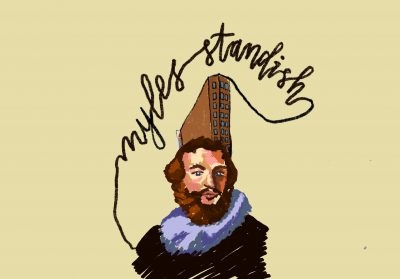TW: This article contains graphic depictions of violence
Yesterday, many news publications reported on the Massachusett Tribe at Ponkapoag’s request to rename our dorm building, Myles Standish Hall, due to Myles Standish’s legacy as a violent and genocidal figure in Massachusetts history.
The Massachusett Tribe at Ponkapoag began their petition to rename Myles Standish Hall to Wituwamat Memorial Hall four weeks ago and has since gathered 532 signatures at the time of publishing.
Recent news coverage comes from an Op-Ed published today on WBUR by Travis Franks, a postdoctoral associate in the Kilachand Honors College.

Franks writes that Myles Standish was aboard the Mayflower in 1620 as the military leader of the Pilgrims. Three years after he arrived in America, he led a group of settlers in massacring members of the Neponset Band of the Massachusett Tribe in the Massacre at Wessagusset.
Standish led the massacre because he believed Wituwamat, a man who was a member of the Neponset Band, had been conspiring against the colony. As Franks points out, contemporary scholars have confirmed this alleged conspiracy was a complete fabrication.
The Massachusett Tribe At Ponkapoag, descendants of the Neponset Band, wrote on their website that Standish invited Massachusett Chiefs Pecksuit, Wittawamut and Chickataubut’s most powerful warriors to a summit. He then ambushed and murdered the leaders, as well as civilians at Wessagussett.
Standish murdered Wituwamat and beheaded him. He then left Wituwamat’s head on display at the Plymouth meetinghouse for months. Standish’s actions were extremely controversial at the time, earning admonishment from Plymouth governor William Bradford.
The Massachusett Tribe Ponkapoag has requested that Myles Standish be renamed after Wituwamat, the renowned Neponsent warrior Standish ambushed and murdered.
Before it was a dorm, Myles Standish was a hotel. Built in the 1920s, the hotel was designed and themed around the landing of the Mayflower in 1620.
Current Assistant Dean for Curriculum & Enrollment Services, Daryl Healea, said in a BUToday YouTube video that its triangular architecture was meant to emulate the ship.
The fact that this hotel was built in 1920 is significant in itself because it demonstrates the building is not a colonial artifact. The holiday of Thanksgiving and the narrative of the benevolent pilgrims only became mainstream in American culture between the 1890s and 1920s due to the rise of nativism and nationalism that surged within white Americans in reaction to the arrival of immigrants at the onset of the 20th century.
As is the case with the tributes and memorials of Confederate soldiers in the South — many of which were built during the 1950s era of Jim Crow segregation — Myles Standish hotel is a product of misplaced, racist nostalgia for some fictional American past.
Boston University inherited the racist fantasy embedded into the very architecture of the building when it purchased the Myles Standish Hotel in 1949. It even advertised this aspect of the dorm building’s history.
In 2009, then residence hall director for Myles Standish Hall Healea stated in a BU Today article, “Captain Myles Standish was an officer hired by the Pilgrims as military advisor for Plymouth Colony. It’s fitting that this residence, home to many students embarking on a life-transforming adventure in education, bears the name of a great American pioneer.”
Standish was not a great American pioneer. After Standish led the Massacre at Wessagusset, the colony at Wessagussett crumbled due to how the massacre destroyed trading relations between the Massachusett tribe and the English colony.
Even if BU had any direct ties to this name — which it does not, as it merely inherited it from the hotel it purchased — the egregious crimes Standish committed against the Massachusett Tribe should be enough reason to rename the building in accordance with the Massachusett Tribe at Ponkapoag’s wishes.
This same principle applies to the Yawkey Center on campus. In 2018, questions were raised whether BU should rename the center after the City of Boston renamed Yawkey Way — the street along Fenway Park — to Jersey Street due to the former’s allegedly racist namesake.
Former Red Sox owner Tom Yawkey was known for his racism. The Red Sox were the last Major Baseball League team to integrate. He was also a big philanthropist, his foundation giving money to our very school.
Some could argue that the Yawkey foundation is a separate entity from its namesake. However, in response to the renaming of Yawkey Street, the Yawkey foundation called Tom Yawkey “a good and decent man,” thus indicating their lack of willingness to take accountability for Tom Yawkey’s racist legacy.
Yawkey Center and Myles Standish Hall are two clear examples of buildings on our very own campus still proudly displaying the names of known racists. It is beyond past time to change this.
During the height of protests against police brutality last Summer, President Brown wrote a letter to students opening the discussion to change the school mascot’s name, Rhett, due to a possible relation to the controversial film “Gone with the Wind.”
If BU was so open to discussing changing Rhett’s name, why not actually do something about these racist buildings?
To be clear, changing the name of these buildings is by no means a significant action in itself — it is the bare minimum. BU should do more to support indigenous peoples, including land-back acknowledgment, supporting indigenous students on campus and committing to tangible financial commitments and donations to indigenous organizations.
But changing the dorm building to Wituwamat Memorial Hall is a step we as students can vocally support for now. There are also events on campus centering indigenous voices. This year, the BU Arts Initiative is continuing an interdisciplinary program called Indigenous Voices in America which hosts a series of events by Indigenous speakers on various topics.
Please sign the petition, and learn more about the Massachusett Tribe at Ponkapoag.




















































































































